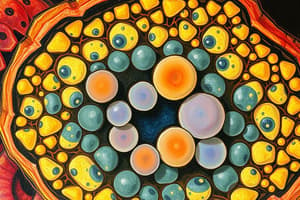Podcast
Questions and Answers
What structure provides support for the cell and has two subparts?
What structure provides support for the cell and has two subparts?
- Nucleus
- Cytoplasm
- Cell Membrane
- Cell Wall (correct)
What is the primary function of vacuoles?
What is the primary function of vacuoles?
Stores material within the cell
What is the Golgi Apparatus made up of?
What is the Golgi Apparatus made up of?
Closely stacked, flattened sacs
Where do ribosomes perform their function?
Where do ribosomes perform their function?
What does the Endoplasmic Reticulum do?
What does the Endoplasmic Reticulum do?
What is cytoplasm?
What is cytoplasm?
What does the nucleolus do?
What does the nucleolus do?
What is the primary function of chloroplasts?
What is the primary function of chloroplasts?
What is a lysosome responsible for?
What is a lysosome responsible for?
What is the function of mitochondrion?
What is the function of mitochondrion?
What is contained in chromatin?
What is contained in chromatin?
What does the cell membrane consist of?
What does the cell membrane consist of?
What are cilia?
What are cilia?
What is flagellum used for?
What is flagellum used for?
What are organelles?
What are organelles?
What do ribosomes look like?
What do ribosomes look like?
The cell wall provides __ for the cell.
The cell wall provides __ for the cell.
The primary function of vacuoles is to __.
The primary function of vacuoles is to __.
Flashcards
Cell Wall
Cell Wall
Provides support for the cell; contains two subparts.
Vacuoles
Vacuoles
Stores materials within the cell
Golgi Apparatus
Golgi Apparatus
Closely stacked, flattened sacs
Ribosomes
Ribosomes
Signup and view all the flashcards
Endoplasmic Reticulum
Endoplasmic Reticulum
Signup and view all the flashcards
Cytoplasm
Cytoplasm
Signup and view all the flashcards
Nucleolus
Nucleolus
Signup and view all the flashcards
Chloroplasts
Chloroplasts
Signup and view all the flashcards
Lysosome
Lysosome
Signup and view all the flashcards
Mitochondrion
Mitochondrion
Signup and view all the flashcards
Chromatin
Chromatin
Signup and view all the flashcards
Cell Membrane
Cell Membrane
Signup and view all the flashcards
Cilia
Cilia
Signup and view all the flashcards
Flagellum
Flagellum
Signup and view all the flashcards
Organelles
Organelles
Signup and view all the flashcards
Ribosomes
Ribosomes
Signup and view all the flashcards
Study Notes
Cell Organelles Overview
- Cell Wall: Firm protective structure providing shape and support in plants, fungi, most bacteria, and some protists; consists of two subparts.
- Vacuoles: Serve as storage units for food, enzymes, and waste, contributing to overall cellular maintenance.
- Golgi Apparatus: Composed of closely stacked, flattened sacs; involved in packaging proteins for export out of the cell.
- Ribosomes: Essential sites for protein synthesis; present as small bumps on the endoplasmic reticulum and free-floating in the cytoplasm.
- Endoplasmic Reticulum (ER): Network of hollow tubes; responsible for transporting materials within the cell.
- Cytoplasm: Gel-like region inside the cell excluding the nucleus, where various organelles are located.
- Nucleolus: Organelle within the nucleus; critical for ribosome production and management of cell functions in eukaryotic cells.
- Chloroplasts: Plant organelles containing chlorophyll; these trap sunlight energy for photosynthesis and impart the green color to plants.
- Lysosomes: Specialized organelles that digest excess or outdated cell parts, pathogens, and food particles, ensuring cellular cleanup.
- Mitochondria: Powerhouses of the cell; they generate usable energy in the form of ATP for cellular activities.
- Organelles: Collective term for all internal structures within a cell, including the nucleus, each performing distinct functions.
- Chromatin: The form of genetic material in the nucleus, consisting of DNA; crucial for genetic regulation and cell division.
- Cilia and Flagella: Hair-like structures aiding in cell movement and environmental sensing; cilia are small and numerous, while flagella are longer and typically singular.
- Cell Membrane: Phospholipid bilayer that surrounds and protects the cell; regulates the movement of substances in and out of the cell.
Studying That Suits You
Use AI to generate personalized quizzes and flashcards to suit your learning preferences.




